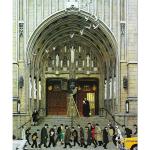Kevin Vanhoozer has done a great service by editing the Cambridge Companion to Postmodern Theology (2003). Though the authors of the various articles differ among themselves, they are all well-informed about postmodern thought and culture and are making an effort to respond from the stance of Christian theology. In his introductory essay, for instance, Vanhoozer provides a helpful summary of certain postmodern tendencies, and adds “an alternative genealogy” that sees nihilistic postmodernism as the “logical culmination of basic modern tendencies.” He locates the birth of modernity in the history of Christian thought, suggesting that Scotus’ endorsement of the univocity of being had the twofold effect of undermining God’s transcendence and freeing metaphysics from revelation.
Nancey Murphy and Brad Kallenberg provide a very clear discussion of “Anglo-American Postmodernity,” centering on Wittgenstein. Modern philosophy, they note, begins with the mage of the “Cartesian theater,” the notion that “the real ‘I’ is an observer ‘in’ the mind, looking at mental representations of what is outside.” This notion of human being and knowing made any contact with the “outside” problematic, and modern philosophy is largely an effort to overcome the skepticism inherent in the Cartesian theater. As they note, “Philosophy’s job became, in the modern era, not the systmatizing of all knowledge . . . but rather the discipline whose job it was to assure that any sort of knowledge was possible by providing the foundations of science and ethics.”
For Descartes, we are always separated from the world by what Richard Rorty calls the “veil of ideas,” which is ultimately all we know. And in some respects the linguistic turn within modern philosophy does not solve the problem: “the problem of the veil of ideas becomes the problem of the veil of language.” Both realism and anti-realism (we are prisoners of interpretation) are working with the same problem, arising from Descartes, mediated through post-Kantian idealism or linguistic philosophy: Can we know that our concepts correspond to reality. A key problem here, the authors claim, is an “inside-out” trajectory of post-Cartesian thought; when philosophy begins from the mind “inside,” it is hard to get out.
The Cartesian theater also dogs modern theology. Schleiermacher attempted to ground Christianity in religious experience, but that raises the inevitable question of whether this experience is purely a human phenomenon (is it the Holy Spirit I feel or the salsa I had for lunch?) which is projected onto God: “a Schleiermacher will lead inevitably to a Feuerbach.” The “inside-out approach to theology will lead inevitably to religious skepticism.”
Wittgenstein argued, by contrast, that “The idea of thinking as a process in the head, in a completely enclosed space, makes thinking something occult.” Wittgenstein suggests an experiment: “Say a sentence and think it; say it with understanding. -And now do not say it, and just do what you accompanied it with when you said it with understanding.” The point, as Wittgenstein puts it, is that when we think in language “there aren’t ‘meanings’ going through my mind in addition to the verbal expressions.” (This is not to say that all thinking is necessarily linguistic – dreams count as thought, and we have other kinds of thoughts without any mental speaking. But when we think in language the meanings are not pre-existing mental operations that have to be translated into a different medium. We actually do think in language. Wittgenstein shows that the problem of thought and language is the problem of the sign – the ancient notion that the verbal sign is translated from a non-verbal mental act.)
Wittgenstein attempts to get us out of the Cartesian theater by appealing to the fact of linguistic meaning. Suppose I look at my hand, and ask “Am I staring at a hand?” Wittgenstein says, “But do you know what the word ‘hand’ means? And don’t say ‘I know what it means now for me.’ And isn’t it an empirical fact – that this word is used like this.” Or, “How do I know that this color is red? It would be an answer to say, ‘I have learnt English.’” The meanings of the particular language arise within a particular social form of life. We are socialized into right use of words like “red” or “wet,” so that “How do I know I’m wet” can be answered by a review of how the concept “wet” and the proper use of the word “wet” by getting rained on, by falling into puddle, by spilling milk on our shirt. As Murphy and Kallenberg say, “For Wittgenstein, our human inability to extract language from world or world from language meant that the picture of the Cartesian theater, which do neatly separated subjects from objects, only muddies the water. In contrast, clarity begins with an acknowledgment of the irreducibly social character of human experience and the intrinsic relation of human experience to the real world: ‘What has to be accepted, the given, is – so one could say – forms of life.’” (I don’t think Wittgenstein’s point solves all the problems – discrete language games can lend themselves to a kind of epistemological tribalism. But I find much of this very compelling.)
Among the other essays in the volume, I would particularly highlight John Webster’s article on theological anthropology and Graham Ward on Deconstructive Theology.














